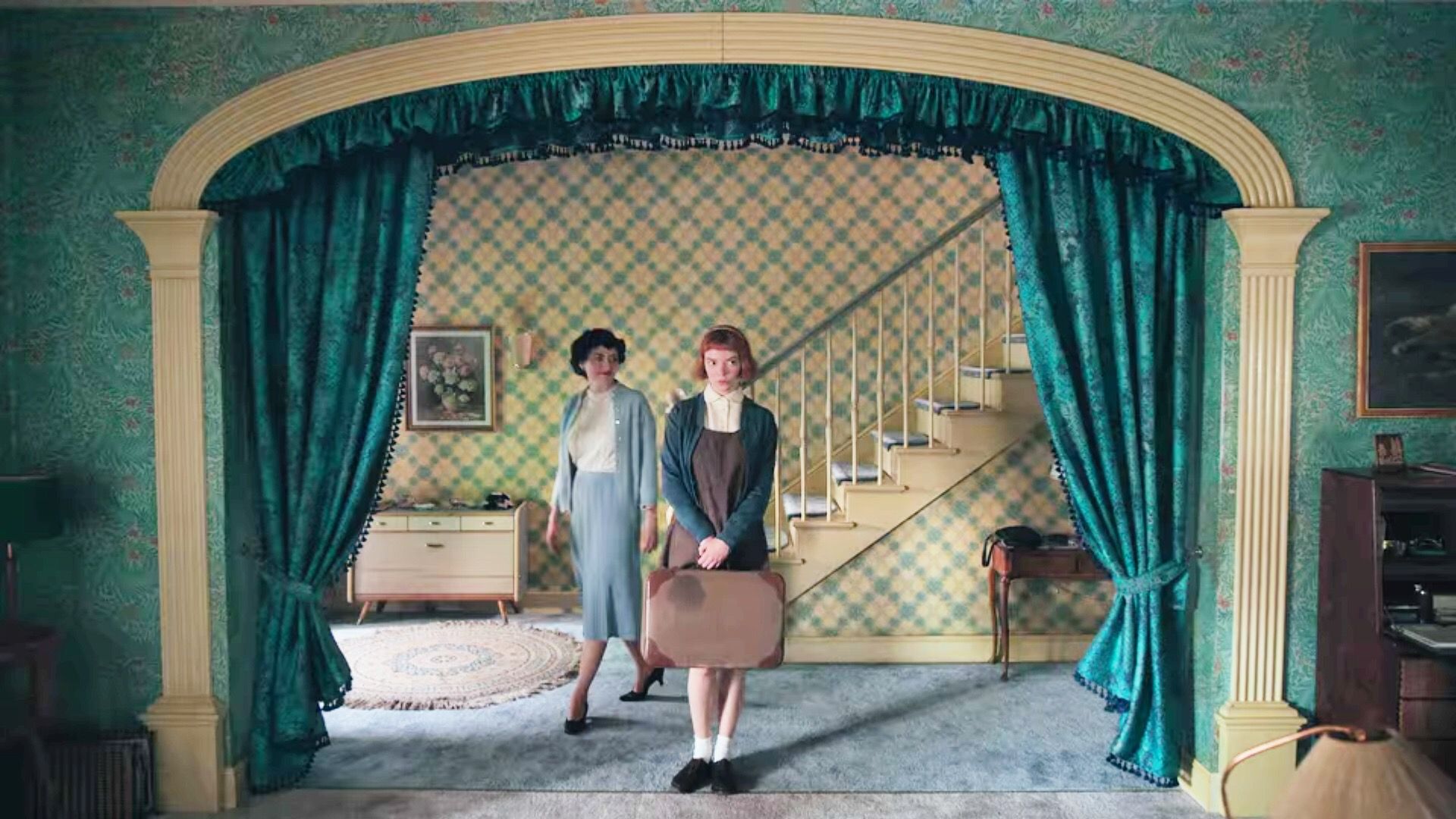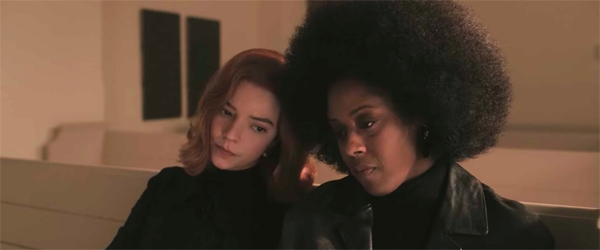
Like many people around the country, I recently watched the popular series on Netflix, The Queen’s Gambit. The Queen’s Gambit is an intriguing show about chess, substance abuse, and the social limitations for women of the era. The show’s protagonist, Beth, is intelligent, resourceful, determined, and studious. She is a champion, a traveller, a stereotype breaker, and she is an adoptee. In addition to the beautiful sets and costumes, the show’s multifaceted depiction of adoption, which is perhaps one of the most realistic portrayals for a fictional show, elevates the show even more.
In the first episode, 9-year-old Beth arrives at Methuen Home after her mother dies in a fatal car crash. Upon her arrival, the headmaster of the girls’ home acknowledges her grief by saying, “Poor dear . . . I know that at this moment, all you are feeling is loss.” But true to many adoption conversations, this grief is immediately diminished. The headmaster then says, “But after grief brings you low, prayer and faith will lift you high, high enough for you to see a new path for yourself. I think, Elizabeth, you’re going to find a much different life for yourself here — a better one than you might have had.”
It is also important to note that while the Methuen Home staff discuss the lack of information surrounding Beth’s father, they do not make any effort to find him to see if he would like custody of his child rather than her placement in an institution. Later in the season, viewers learn that Beth’s father is indeed alive. This puts Beth in a similar position to 80% of the current children living in institutions around the world, who have at least one living parent (LUMOS, 2019).
Beth and the other girls at Methuen Home take daily “vitamins” that make Beth feel woozy at first. Jolene, who becomes a dear friend to Beth, advises her that the pills work better at night. The “vitamins” are actually a tranquilizing medication that produces a hallucinogenic effect for Beth, in which she sees a giant chess board on the ceiling. These hallucinations aid Beth alongside her natural gift for chess. One day, the Methuen Home staff stop giving out these pills because of a “new state law — no more tranquilizers for kids.” The use of psychotropic medication for children in state custody is still common even today. I interned for the Missouri Department of Social Services – Children’s Division last year, which was recently sued for the overuse of psychotropic medications of children in their care. However, they are not alone in these types of lawsuits. Many other states have been implicated for similar controversies.

In the second episode, Beth is adopted by an older couple. When meeting them, Beth is made to lie about her age to her new adoptive parents. She begins to reveal that she is actually 15, but the headmaster at the orphanage looks at her, and she says, “yes, I’m 13.” Fraudulent paperwork and falsified information to push an adoption through is rampant in the adoption system. As Beth packs her belongings from her bed, she has a final conversation with Jolene. Beth says, “I’m sorry you didn’t get adopted.” This tender moment between friends is another realistic portrayal of the institutional racism embedded in the adoption system, where children of color are disproportionately represented in state care and less likely to get adopted (McCarthy, 2016).
This episode also highlights some of the complications for adoptive families during the diffictult transition immediately post-adoption. Beth’s new adoptive mother’s use of the same tranquilizing medication and zoning out could indicate post-adoption depression, which is a phenomenon much like postpartum depression. The couple’s divorce soon after Beth comes to the family could also indicate that Beth was a “save the marriage” type of project. It was also mentioned that the adoptive parents used to have a child. Thus, the couple’s desire for an older child could have been to match the age of the child they lost, which is something adoptive parents sometimes attempt and has been proven to be harmful (Walsh, 2015). Regardless of the situation, Beth’s arrival to the family is awkward and sometimes cold and shows that adoption does not mean there will be a perfect synthesis into a new family. Despite the initial challenges, Beth’s adoptive mother optimistically says, “I believe I can learn to be a mother.” The word learn in this statement is critical, because it shows that Beth’s mother understands that to become a family will require work on her part, as well.

Even with rising success and fame from her incredible chess playing ability and a newfound stability and freedom with her adoptive mother, Beth’s past traumas continue to haunt her. On several occasions, Beth painfully experiences flashbacks to the horrific car crash, in which her biological mother attempted a murder-suicide. These scenes show that adoption does not wipe the slate clean. In the third episode, Beth describes chess as “a world of just 64 squares.” She says, “I feel safe in it. I can control it. I can dominate it. And its predictable, so if i get hurt I only have myself to blame.” This quote makes even more sense when considering Beth’s upbringing, in which she experienced a major breach of the social contract when her biological mother, the person who should love and protect her, tried to kill her as well as the total lack of control she had during her years at Methuen Home and regarding her adoption.
In the fourth episode of the show, Beth’s adoptive mother suddenly dies at the hotel during one of the chess competitions. Following the death, Beth lives at home by herself and with a short term roommate. Though Beth and her adoptive mother had a complicated relationship, there was genuine care on both sides, and this can be seen by Beth wearing her adoptive mother’s robe and by her defending her adoptive mother to her estranged adoptive father. Beth’s adoptive father hires a lawyer to force Beth to leave the house. Stunned at his callous behavior, she reminds him, “You adopted me. I didn’t ask you to. You’re my legal father.” This line serves as a reminder that adoptive parents are the party with control and choice in terms of adoption. Later in the conversation, Beth argues, “I’m not an orphan. I’m your daughter,” to which Beth’s adoptive father replied, “Not in my book, you aren’t.” This conversation highlights the repeated abandonments adoptees may experience from their biological and adoptive families and that adoption challenges can and do continue into adulthood for adoptees. Luckily, Beth’s chess money provided her with enough money to buy the house outright and continue living there.
Beth’s lack of structure and lack of regular social connections in her life exacerbates her already troublesome substance abuse. Beth’s continued use of the tranquilizing medication as well as alcohol inhibit her performance at competitions, as she arrives late and unprepared. Her substance use also pushes friends away from her, but Beth is fortunate enough to have friends from the chess world who care about her and attempt to tell her their concerns. As Beth begins to dress differently and do her makeup in darker and bolder styles, the progression of Beth’s substance abuse disorder reminded me of a warning from a previous episode in which a fellow competitor tells Beth, “You’ve got your gift and what it will cost you. Who knows what that will be. You’ve got so much anger in you. You’ve got to be careful.” Beth’s dependency on substances is partially learned from Methuen Home, partially observed from her adoptive mother’s use of the same substances, and could be partially a grief response following her adoptive mother’s death. Additionally, it is important to note that adoptees have a higher rate of substance abuse disorder than non-adopted people in adulthood (Hjern et al., 2002).

Toward the end of the show, Jolene, Beth’s friend from Methuen Home, reenters Beth’s life to tell her that Mr. Scheibel, the janitor who first taught Beth how to play chess, has died. While Jolene’s reammergance does feel somewhat out of the blue, this could be a commentary on the disjointedness of some relationships for adoptees when adoptees lose touch with important people from the past. As a part of the healing process from the grief over Mr. Scheibel, Beth and Jolene return to significant places from her past. They first visit the trailer Beth lived in with her mother. They attend Mr. Scheibel’s memorial service. And they return to Methuen Home. As Beth enters the basement where she once played chess, she notices a board where Mr. Scheibel had cut out and hung up every newspaper clipping about Beth’s various chess victories, the letter she had written him after her adoption, and a small photo of the two of them. In this moment, she can see that, despite rejections from both her biological and adoptive fathers, she has had a fatherly figure supporting her this whole time. These revisitations of places from the past are significant because it is the first time that Beth chooses to confront the places that haunt her and have shaped her, rather than running away from those feelings via addictive behaviors including substance use, her obsession with chess, gambling, or shopping all of her money away.
Jolene’s visit to Beth is timely because it is right before her largest chess match yet. At this point, Beth’s life is in shambles – she has had major fallings out with several chess friends, her house is a mess, and she doesn’t have enough money for a plane ticket to Russia for the world championship. Jolene not only helps Beth emotionally heal some of the wounds from her childhood, she also offers to help Beth financially by lending her the money for the flight. In response, Beth asks if Jolene is her guardian angel, to which Jolene poignantly responds, “We weren’t orphans as long as we had each other… I’m not your guardian angel. I’m not here to save you. Hell, I can barely save me. I’m here because you need me to be. That’s what family does. That’s what we are.”
The Queen’s Gambit is a show about adoption, in which there is no savior or rescuer and where adoption does not inherently make Beth’s life easy or happy. Beth’s adoption certainly gives her access to chess events and the nurturance to regularly practice, but it does not resolve Beth’s past traumas. While Beth’s adoptive mother, Mr. Scheibel, Jolene, and Beth’s chess friends root for her success throughout different chapters of her life, none of them have the power to save Beth from the destructive path she is on. And like with many real-life adoptees, it is when Beth is able to connect with someone who shares her orphan background and truly understands her in that way, do the hard work of facing the places that shaped her past and present, and create a sense of continuity for herself, that she is able to heal and grow in new ways. For Beth, this means flushing her drugs away, repairing relationships with those who care about her, and truly living in the present and in her own skin for the first time. The Queen’s Gambit culminates with Beth’s victory in Moscow at the chess world championship, but much more important and difficult than the game, her changed self is the true victory for Beth.
References
Hjern, A., Lindblad, F., & Vinnerljung, B. (2002). Suicide, psychiatric illness, and social maladjustment in intercountry adoptees in Sweden: a cohort study. The Lancet, 360(9331), 443-448. https://doi.org/10.1016/S0140-6736(02)09674-5
LUMOS. (2019). Home page. Retrieved from https://www.wearelumos.org/
McCarthy, M. (2016). Why is adoption so expensive? A look at the rising costs. Donaldson Adoption Institute. Retrieved from https://www.adoptioninstitute.org/news/why-is-adoption-so-expensive-a-look-at-the-rising-costs/
Walsh, Froma. Normal Family Processes Fourth Edition (2015). New York: The Guilford Press.
Also read this Medium post on the topic of the portrayal of adoption in The Queen’s Gambit.
